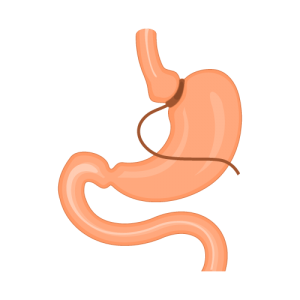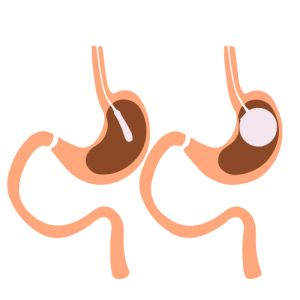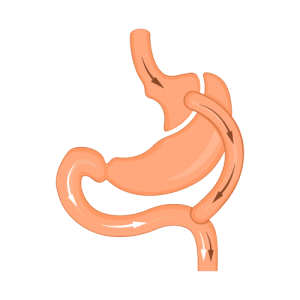Bariatric Surgery
Bariatric Surgery in Dubai
Welcome to our dedicated hub for transformative weight loss solutions – led by the expert guidance of Dr. Rohit Kumar, a renowned bariatric surgeon in Dubai. Unveil a healthier, happier you through our comprehensive range of bariatric procedures, carefully curated to address obesity when conventional methods fall short.
Bariatric surgery, including procedures like Gastric bypass, is a proven method for permanent weight loss by resetting appetite and satiety signals, allowing individuals to feel fuller on smaller meals. This surgical intervention is recommended when traditional weight loss methods, such as diet and exercise, have not been effective.
Discover the gold standard in weight loss surgery, with options such as Gastric Band, Endoscopic Balloon Placement, Laparoscopic Sleeve Gastrectomy, Laparoscopic Roux-en-y Gastric Bypass, Laparoscopic Mini Gastric Bypass, and Redo Bariatric Surgery. Dr. Rohit Kumar, your trusted partner on this journey, leverages a wealth of clinical data, affirming the safety and effectiveness of bariatric surgery.
Dr. Rohit Kumar, a leading Indian bariatric surgeon in Dubai with over 20 years of experience, specializes in these life-changing procedures. As the Medical Director in IMH, Dr. Kumar has successfully performed over 1000+ Bariatric Surgeries including Gastric Balloons. His expertise and commitment to patient care have made him a trusted name in the field.
Embark on your weight loss odyssey with confidence, knowing that you are in the capable hands of the best bariatric surgeon in Dubai. Our commitment to your well-being extends beyond borders, catering to those searching for the best weight loss surgeon near me or the top Indian bariatric surgeon in Dubai.
Experience the pinnacle of bariatric surgery excellence with Dr. Rohit Kumar, where innovation meets compassion. Your transformative journey starts here – achieving your weight loss goals has never been more accessible. Unlock a healthier tomorrow with Dubai’s leading bariatric surgery expert, Dr. Rohit Kumar.
What is Bariatric Surgery?
Bariatric Surgery is a weight loss surgery usually performed for individuals dealing with Obesity. Bariatric surgeons have access to substantial body of clinical data that support the use of surgery as a safe and effective weight loss treatment when other methods have failed.
It includes a variety of processes and procedures like Gastric Band, Endoscopic Balloon Placement, Laparoscopic Sleeve Gastrectomy, Laparoscopic Roux-en-y Gastric Bypass, Laparoscopic Mini Gastric Bypass and Redo Bariatric Surgery.
Bariatric surgery, expertly conducted by Dr. Rohit Kumar, stands as a beacon of hope for individuals grappling with obesity. This transformative approach offers a suite of procedures, including Gastric Band, Endoscopic Balloon Placement, Laparoscopic Sleeve Gastrectomy, Laparoscopic Roux-en-y Gastric Bypass, Laparoscopic Mini Gastric Bypass, and Redo Bariatric Surgery.
Who Needs Bariatric Surgery?
When conventional weight loss methods prove insufficient, the skilled hands of the best bariatric surgeon in Dubai, Dr. Rohit Kumar, become a lifeline. Whether you seek the best bariatric surgery near you or the top Indian bariatric surgeon in Dubai, our comprehensive solutions cater to diverse needs.
Embark on a transformative journey towards sustainable weight loss – your pathway to a healthier tomorrow begins with Dr. Rohit Kumar’s expertise and compassion.
what are the 4 types of bariatric surgery?
There are several types of bariatric surgery, each with its own benefits and considerations. The four main types of bariatric surgery are:
- Gastric Bypass Surgery:
Gastric bypass, also known as Roux-en-Y gastric bypass, is a popular bariatric surgery that involves creating a small pouch from the stomach and connecting it to the small intestine. This rerouting of the digestive system reduces the amount of food you can eat and alters the absorption of nutrients, leading to significant weight loss. - Sleeve Gastrectomy:
Sleeve gastrectomy, often referred to as gastric sleeve surgery, involves the removal of a large portion of the stomach, leaving behind a smaller, sleeve-shaped stomach. This procedure restricts the amount of food you can consume and reduces the production of hunger-inducing hormones, helping you feel full faster and eat less. - Gastric Banding Surgery:
Gastric banding, or laparoscopic adjustable gastric banding, involves placing an inflatable band around the upper part of the stomach, creating a small pouch. The band can be adjusted to control the size of the pouch and the rate at which food passes through, promoting weight loss by limiting food intake and inducing a feeling of fullness. - Biliopancreatic Diversion with Duodenal Switch (BPD/DS):
BPD/DS is a complex bariatric surgery that combines two procedures. The first step is similar to a sleeve gastrectomy, where a portion of the stomach is removed to reduce its size. The second step involves rerouting the intestines to limit the absorption of calories and nutrients, resulting in substantial weight loss.
Each type of bariatric surgery has its own benefits and considerations, and the most suitable option for you will depend on your individual health needs and weight loss goals. It’s important to consult with a qualified healthcare provider to determine the most appropriate treatment plan for your specific situation.
Gastric Band

Gastric Banding is a surgical treatment to treat obesity. It is a minimally invasive, quick, reversible, and adjustable surgical procedure that decreases the size of the stomach to reduce food intake. It is done by placing an inflatable band around the top of the stomach, which results in a person feels fuller with less food. Post-surgery it is necessary to follow a strict liquid diet, with gradual inclusion of a soft diet. The procedure can result in significant weight loss if followed religiously. The gastric band is fitted by the surgeon under general anesthesia.
Balloon

The gastric Balloon is a nonsurgical revolutionary alternative for patients who have failed diet attempts or have a lifestyle that restricts them to undergo any physical exercise. The balloon creates a feeling of fullness, allowing you to eat less without feeling hungry.
The patient swallows a capsule containing a deflated balloon, connected to a hollow plastic tube. Once in the stomach the balloon is filled with fluid and the tube is detached from the balloon and removed from the mouth. The balloon stays in the stomach for three to twelve months after which it is removed. It is a good way to lose 10 to 15% of total body weight.
Laparoscopic Sleeve Gastrectomy

A sleeve gastrectomy is performed for people who are excessively obese and have serious health problems. The surgeon removes a part of the stomach and creates a sleeve or tube out of the rest. The new banana-shaped stomach is much smaller in size and makes the person feel fuller quickly and helps him eat less. The surgery does not have any effect on the natural movement of food and allows essential vitamins and nutrients to be fully absorbed.
In clinical studies, patients lost an average of 55% of their excess weight, and have been shown to help resolve type2 diabetes, high blood pressure, obstructive sleep apnea, and high cholesterol.
The surgeon will explain the possible risk factors and post-operation care.
Laparoscopic Roux-en-y Gastric Bypass

Gastric bypass, also called Roux-en-Y gastric bypass, is a weight-loss surgery in which a small pouch is created in the stomach and connected directly to the small intestine. Post-surgery the swallowed food goes to the pouch and then directly to the small intestine, bypassing most of your stomach and the first section of your small intestine. This will help in reducing the absorption of calorie intake considerably. Gastric bypass is done when all other methods of weight loss have failed and you are at risk of serious health conditions.
The patient may have to meet certain medical guidelines to qualify for weight-loss surgery which might include an extensive screening process. The patient must also be willing to make permanent changes to lead a healthier lifestyle.
The surgeon will explain the possible risk factors and post-operation care.
Laparoscopic Mini Gastric Bypass

Mini gastric bypass procedure is a minimally invasive, short, simple, and successful laparoscopic weight loss surgery. In this procedure, 2 to 7 feet of intestines are bypassed, unlike the Gastric bypass which completely bypasses the small intestines.
This surgery consumes less time, is simpler and has lower chances of complications, and is now being preferred by many surgeons.
The surgeon will explain the possible risk factors and post-operation care.
